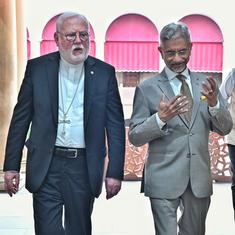Indian government conducted targeted killings in Pakistan, claims report
The killings were part of the government’s new counter-terrorism strategy, according to ‘The Guardian’. New Delhi has denied the allegations.

The Indian government allegedly assassinated individuals in Pakistan as part of its new strategy to eliminate terrorists living on foreign soil, The Guardian reported on Thursday quoting unidentified Indian and Pakistani intelligence operatives.
The report claims that the Indian government has killed up to 20 persons in Pakistan since 2020. The killings were carried out by unknown gunmen in Pakistan allegedly through the direct involvement of India’s foreign intelligence agency Research and Analysis Wing.
This is the first time that Indian intelligence personnel have discussed the alleged operations in Pakistan, according to The Guardian. Detailed documentation seen by the United Kingdom-based newspaper allegedly show the Research and Analysis Wing’s direct involvement in the killings.
India’s external affairs ministry has denied all the allegations made in The Guardian’s report. In response to the newspaper, the ministry reiterated an earlier statement against Pakistan’s allegations, saying that the claims were “false and malicious anti-India propaganda”.
The Indian foreign intelligence agency allegedly changed its strategy to assassinate potential threats after the 2019 Pulwama attack, which was carried out by the Pakistan-based terror group Jaish-e-Mohammed, The Guardian reported quoted unidentified Indian officials as saying.
On February 14, 2019, an explosive-laden car driven by a suicide bomber rammed into a bus carrying Central Reserve Police Force personnel, killing 40 of them in Jammu and Kashmir’s Pulwama district.
“After Pulwama, the approach changed to target the elements outside the country before they are able to launch an attack or create any disturbance,” an Indian intelligence operative told The Guardian. “We could not stop the attacks because ultimately their safe havens were in Pakistan, so we had to get to the source.”
The alleged modus operandi
As part of its new counter-terrorism strategy, the Indian foreign intelligence agency developed sleeper-cells that mostly operated out of the United Arab Emirates, The Guardian reported.
Pakistani officials have accused these cells of paying millions of rupees to local criminals or poor Pakistanis to carry out the assassinations.
Indian agents infiltrated networks of Islamic State and units connected to the Taliban through social media, the report claims. They then “recruited and groomed” Pakistani Islamist radicals to assassinate Indian dissidents by telling them they were carrying out “sacred killings” of “infidels”.
This was the case in the killing of Sikh separatist leader in Pakistan, Paramjit Singh Panjwar, who was shot dead in Lahore in May, reported The Guardian.
Panjwar’s killing was before the United States and Canada made similar allegations against India. The United States has said that it foiled an alleged plot to assassinate Sikh separatist leader Gurpatwant Singh Pannun on American soil last year.
In November, the United States Attorney’s Office, Southern District of New York, announced that it had filed “murder-for-hire charges” against an Indian national Nikhil Gupta in connection with his alleged participation in a thwarted plot to assassinate Pannun. It also alleged that Gupta had been recruited by an Indian government employee, who “directed a plot to assassinate on US soil an attorney and political activist who is a US citizen of Indian origin residing in New York city”.
The United States’ Justice Department alleged that the alleged plot to kill Pannun was part of a larger conspiracy to kill one person in California and at least three in Canada.
Canadian Prime Minister Justin Trudeau had told his Parliament in September that his country’s intelligence agencies were pursuing “credible allegations” linking agents of the Indian government to the killing of Sikh separatist leader Hardeep Singh Nijjar.
Indian government denies allegations
Denying all the allegations made in The Guardian’s report, India’s external affairs ministry has reiterated an earlier statement that the claims were “false and malicious anti-India propaganda”.
In January, Islamabad had said that it had “credible evidence” linking “Indian agents” to the assassination of two of its nationals, Shahid Latif and Riyaz Ahmad. The two, associated with terror groups Jaish-e-Mohammed and the Lashkar-e-Taiba, were wanted terrorists in India.
New Delhi also reiterated an earlier denial by External Affairs Minister S Jaishankar that targeted killings in other countries were “not the government of India’s policy”.
Also read:
- A decade under Modi: Aggressive foreign policy yields mixed returns
- RAW, Pakistan or internal tussle? Deaths of Khalistan leaders overseas are leading to speculation









